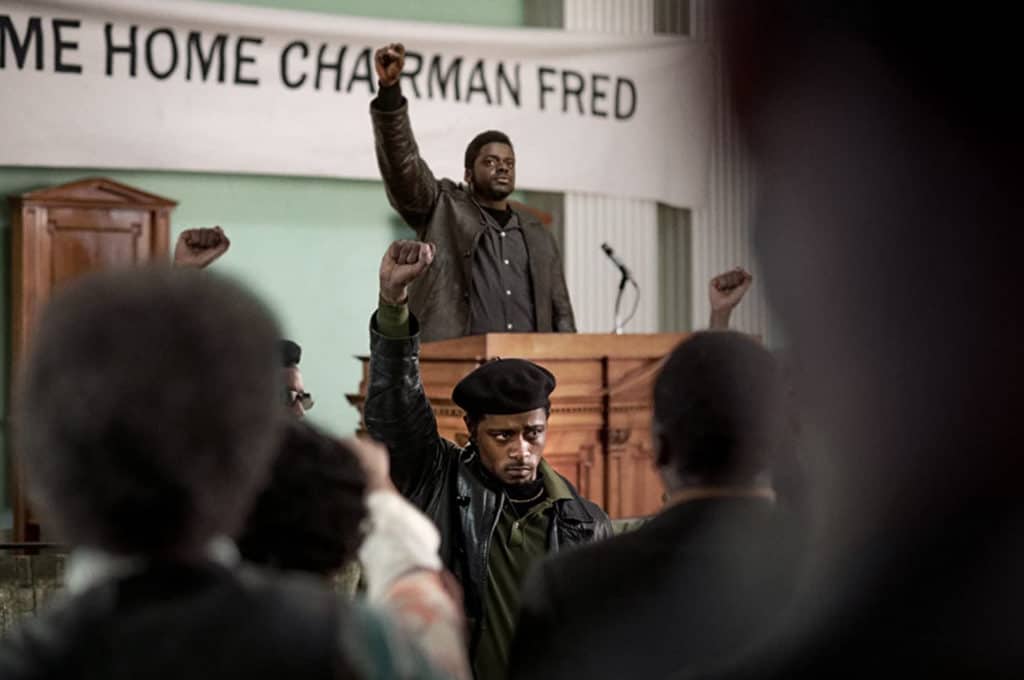Moviegoer: Judas and the Black Messiah

How one man helped the government destroy a visionary
Streaming on HBOMax February 12
By Diana Beechener
In 1966, Bill O’Neal (LaKeith Stanfield: The Photograph) doesn’t have time for the civil rights movement. He’s a car thief who’s caught after boosting a car at the wrong time. He knows he’s going away for a long time until a man comes in and offers him a deal: Join the Chicago Black Panther Party and report back to the FBI about the happenings.
It’s a sweet deal for Bill. He gets FBI stipends, a new car that’s all his, and all he has to do is ingratiate himself with a bunch of people he doesn’t care about. It’s hard-going at first. Bill’s lack of discipline gets him reprimanded and he thinks the party leader, Fred Hampton (Daniel Kaluuya: Queen & Slim), is just a lot of talk. Bill happily meets his handler, eats a steak dinner, and rats on all the activities he’s seen.
But the longer Bill spends with Hampton and the Panthers, the more he sees the inequality facing Black people. Unlike other people who speak of revolution, Hampton puts his beliefs into action. An ardent socialist, Hampton begins initiatives to give children free meals and opens a free clinic for his community.
Hampton doesn’t just draw in Bill, however, he sets his sights on unifying all oppressed people, to form a rainbow coalition that would fight against the unjust government and police. Soon, the Panthers have alliances with other Black groups, Puerto Rican activists, and even white groups that fly the Confederate flag. All agree that Hampton’s vision of a better world is one they should work for together.
This sort of unity among racial groups that once fought amongst themselves terrifies the Chicago police and the FBI. Fearing that Hampton’s unification movement will make him a national figure, like that of Dr. King, the FBI decides that it might be easier to eliminate a threat, rather than combat it. Bill is given a new assignment: Help bring down Hampton.
Though the ending is historic fact, this is a little-known chapter in American history, and it may be time to discuss how the FBI worked to crush the civil rights movement via surveillance and violence. Director/co-writer Shaka King (Shrill) makes a powerful statement. The idea that governments will always seek to destroy those who can bring about real change is not new, but it is still true. King captures the magnetic energy of Hampton, showing the audience exactly why this man could have started a movement.
King does an excellent job of grounding the film in the 1960s while demonstrating why Hampton’s story and goals are prescient today. He also does a wonderful job of explaining the exact conditions Hampton was fighting against. By cutting between the war zone that Hampton and the Panthers had to negotiate and the FBI offices where suited men plot to destroy them, you see the true power imbalance in America.
The center of the film is the dynamic between Bill and the two forces pulling at his conscience: The FBI and Hampton. Stanfield offers a nuanced performance of the conflict. His Bill is a man trapped. He’s seen the light too late and now he doesn’t know how to extricate himself or Hampton from the tangled web of lies he’s put them in.
While Stanfield does an able job showing the building tug-of-war for his soul, the real star of the film is undoubtedly Kaluuya. As Hampton, he delivers fiery speeches filled with so much charisma and feeling, it’s easy to understand how he unified the warring parties of Chicago. Hampton is a man with vision and compassion. His purpose is to help the people, and he will not deviate from that goal.
This performance makes Kaluuya the biggest asset and biggest problem in the film, as whenever he isn’t on screen, Judas and the Black Messiah suffers. Stanfield is a brilliant actor, but the script does little to make his internal war as interesting as Hampton’s mission. The film also stumbles once while trying to make Bill’s FBI handler more sympathetic. It’s an unnecessary lull in a film that consistently builds tension.
If you’ve never heard of Fred Hampton, Judas and the Black Messiah will be an eye-opener. It’s a vital piece of history brilliantly realized on film.
Good Drama * R * 126 mins.
